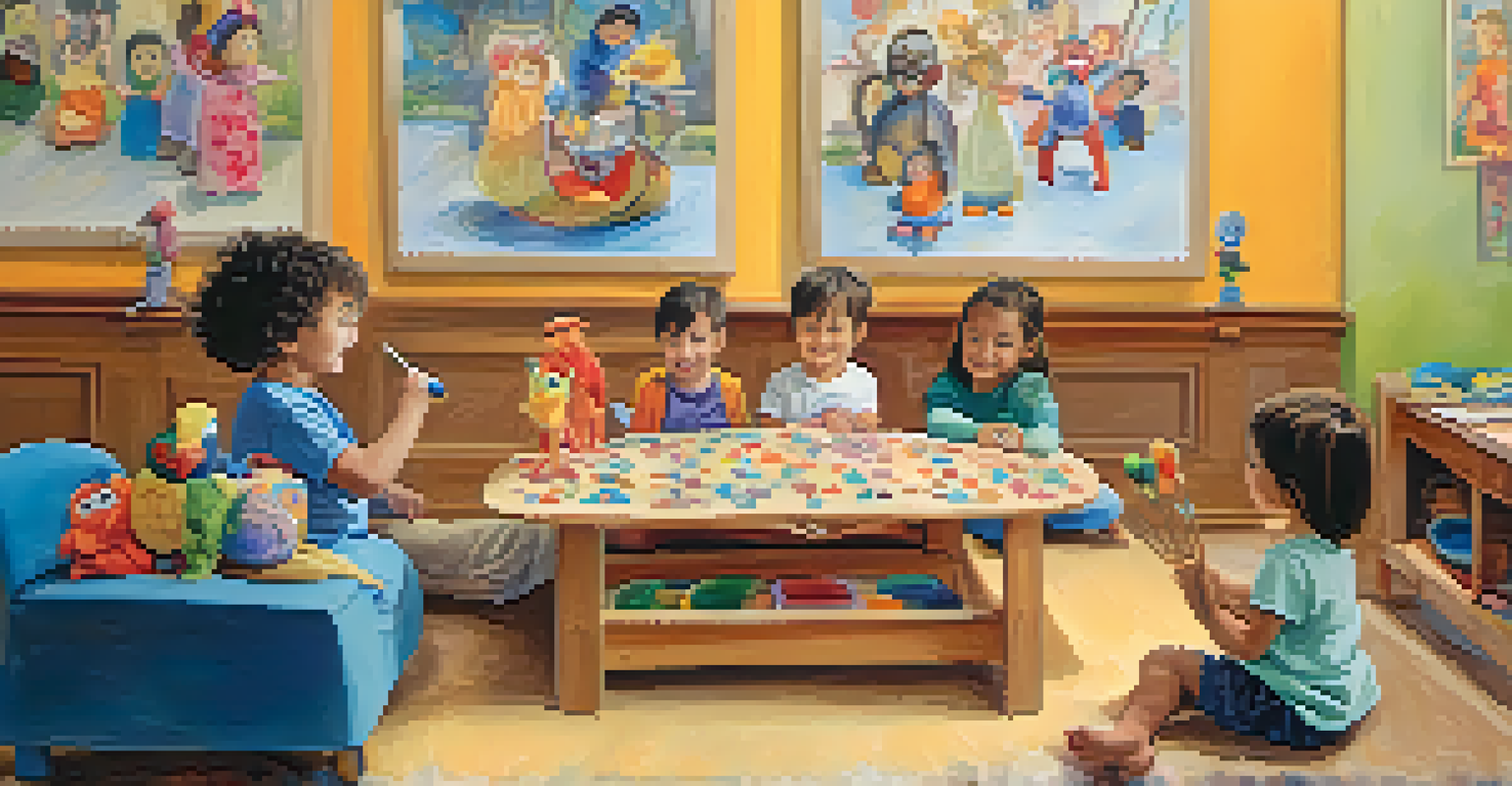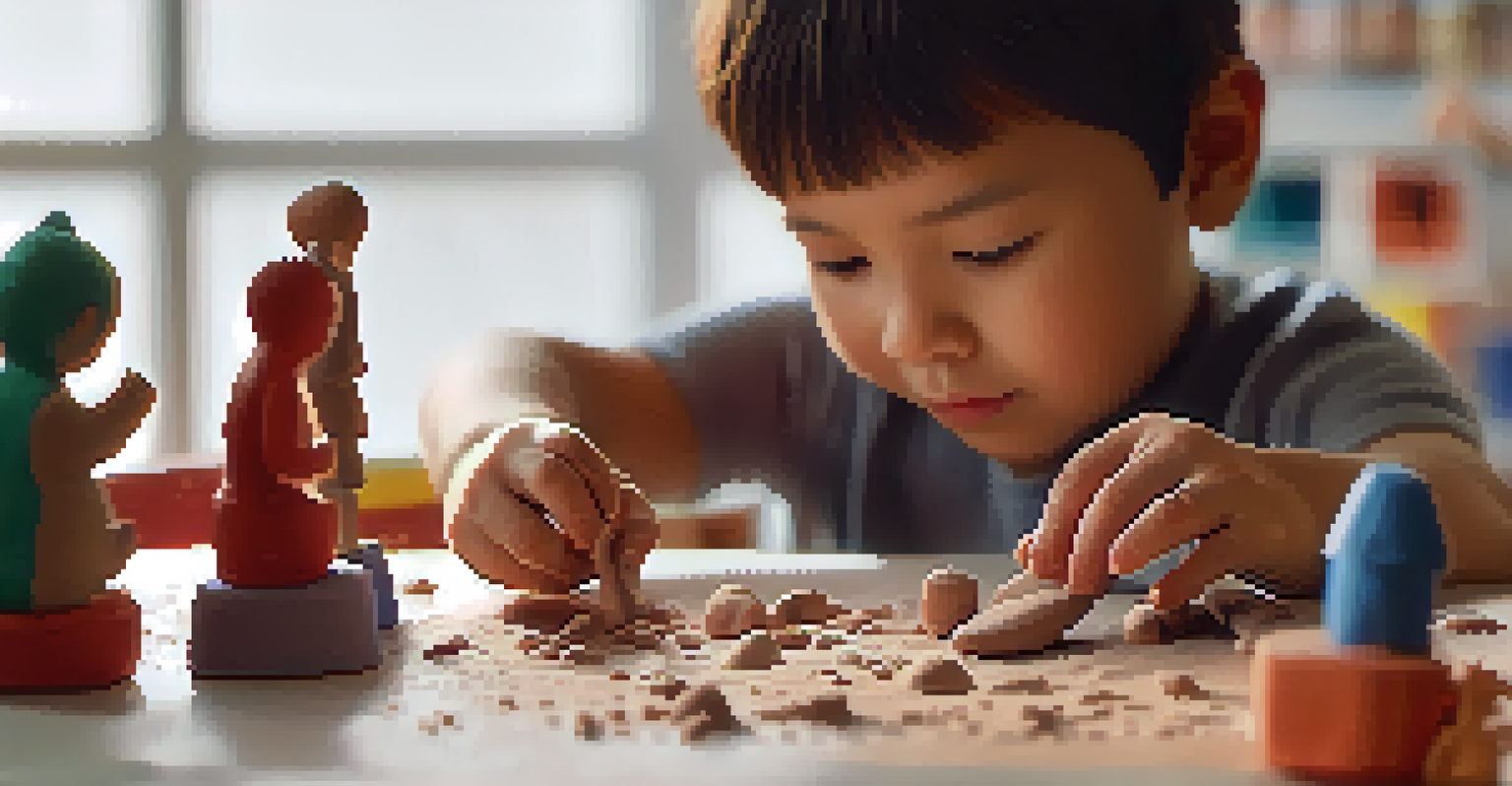The Role of Play Therapy in Mind-Body Healing for Children

Understanding Play Therapy: A Vital Tool for Healing
Play therapy is a therapeutic approach that utilizes play to help children express their feelings and thoughts. Through play, children can process emotions and experiences that they might struggle to articulate. This method is particularly effective for young ones, as it speaks their language, allowing them to engage in a natural and comfortable way.
Play is the highest form of research.
In play therapy, therapists create a safe, supportive environment where children can explore their feelings through various play activities, such as drawing, role-playing, or using toys. This not only aids in emotional expression but also fosters creativity and problem-solving skills. Ultimately, it serves as a bridge between a child’s inner world and the external environment, promoting healing.
The role of play therapy in mind-body healing is significant, as it addresses both emotional and physical well-being. When children are allowed to express themselves freely, they can release pent-up emotions that may manifest physically, leading to a more balanced state of health.
The Connection Between Emotions and Physical Health
It's essential to recognize that our emotions can have a profound impact on physical health, especially in children. Stress, anxiety, and unresolved trauma can lead to physical symptoms such as headaches, stomachaches, or even chronic pain. By addressing these emotional issues through play therapy, children can learn to manage their feelings and reduce these physical manifestations.

For instance, a child dealing with anxiety might express their fears through a puppet show in therapy. This not only helps them articulate their feelings but can also lead to a decrease in anxiety-related physical symptoms. The act of play becomes a therapeutic tool that promotes both emotional clarity and physical relief.
Play Therapy Helps Emotional Expression
Through play, children can articulate their feelings and process emotions they may struggle to express verbally.
By fostering this connection between emotions and physical health, play therapy encourages children to develop a holistic understanding of their well-being. They learn that feelings are valid and manageable, which can contribute to a healthier mind-body relationship.
How Play Therapy Supports Emotional Regulation
Emotional regulation is the ability to manage and respond to emotional experiences appropriately. Play therapy equips children with tools to understand and control their emotions, which is critical for their overall development. Through playful interactions, therapists guide children in recognizing their feelings and finding constructive ways to express them.
Creativity is intelligence having fun.
For example, when a child plays with clay, they might create forms that represent their feelings—like a ‘sad’ figure or a ‘happy’ face. This tangible representation allows them to process their emotions more effectively, helping them articulate what they feel. As they practice this, they become more adept at regulating their emotional responses in real-life situations.
As children learn to navigate their emotions through play, they build resilience and coping strategies that serve them throughout their lives. This foundation of emotional intelligence is a crucial aspect of mind-body healing, fostering a sense of empowerment and self-awareness.
Building Trust and Safety in Therapeutic Play
A key component of effective play therapy is the establishment of trust and safety between the therapist and the child. When children feel safe, they are more likely to open up and engage in the healing process. Therapists create a nurturing environment where children can explore their thoughts and feelings without judgment.
This sense of safety allows children to take emotional risks, such as confronting fears or expressing anger through play. For instance, a child might role-play a scenario where they feel threatened, enabling them to process and reframe their experiences. This is vital for their emotional and psychological growth.
Emotions Impact Physical Health
Addressing emotional issues in children through play therapy can help reduce physical symptoms like anxiety-related pain.
As trust builds, the therapeutic relationship becomes a powerful catalyst for healing. Children learn that their feelings are valid and that they can express themselves freely, which is essential for both emotional and physical well-being.
Play Therapy Techniques for Mind-Body Healing
Play therapy encompasses various techniques tailored to meet each child's unique needs. Techniques can include art therapy, sand tray therapy, and storytelling, all of which help children express themselves in different ways. These activities allow children to explore their emotions and experiences creatively, often leading to breakthroughs in understanding their feelings.
For example, using art materials can help a child represent their feelings visually, providing insight into their emotional state without the need for words. Similarly, sand tray therapy allows children to create scenes with miniature figures, helping them externalize their thoughts and experiences. Such techniques not only foster emotional expression but also promote mindfulness, enhancing the mind-body connection.
By incorporating these diverse techniques, therapists can adapt their approach to suit each child's individual needs, leading to more effective healing outcomes. The flexibility of play therapy ensures that children are engaged and empowered throughout their healing journey.
The Role of Caregivers in Supporting Play Therapy
Caregivers play an integral role in the success of play therapy by providing support and encouragement. Their involvement can enhance the therapeutic process, as they help reinforce the skills and insights gained during sessions. When caregivers understand the principles of play therapy, they can better support their child's healing journey at home.
For example, if a child learns coping strategies in therapy, caregivers can practice these techniques with their child in everyday situations. This collaboration not only strengthens the child’s emotional resilience but also fosters a deeper bond between the caregiver and the child. It's essential for caregivers to be open to learning and adapting alongside their child.
Caregivers Enhance Therapy Success
Involvement of caregivers in play therapy reinforces skills learned, fostering emotional resilience and deeper bonds with their child.
By actively participating in the therapeutic process, caregivers can create a nurturing environment that promotes emotional and physical well-being. This support system is crucial for children as they navigate their healing journey, emphasizing that they are not alone.
The Long-Term Benefits of Play Therapy
The long-term benefits of play therapy extend far beyond the therapy room. Children who engage in play therapy often develop improved emotional regulation, stronger coping skills, and better social interactions. These foundational skills can lead to healthier relationships and overall well-being as they grow.
Moreover, children who learn to express themselves effectively through play therapy are more likely to carry these skills into adulthood. They develop a deeper understanding of their emotions, making it easier to navigate challenges later in life. This emotional intelligence can also enhance their academic and social performance.

Ultimately, investing in play therapy is an investment in a child's future. It equips them with essential tools for mind-body healing, fostering resilience and promoting a lifelong journey of self-discovery and emotional health.